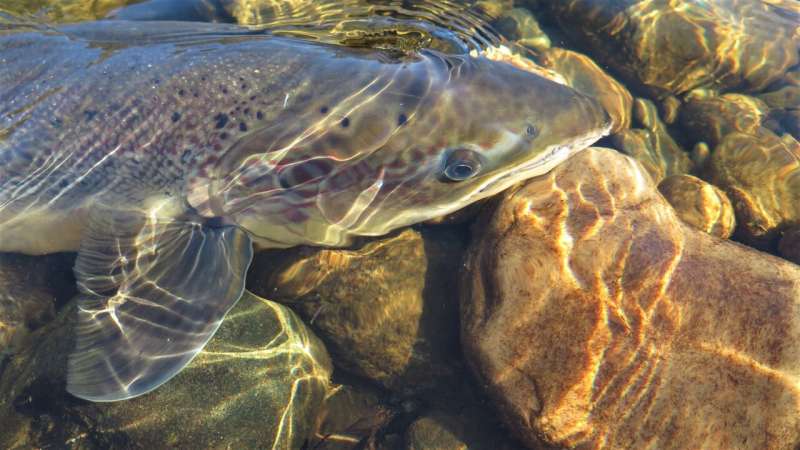December 23, 2021 report
Farmed fish breeding with wild fish is changing the life cycle of wild fish

A team of researchers from the Norwegian Institute for Nature Research and Rådgivende Biologer, has found that interbreeding between farmed salmon and wild salmon is changing the life cycle of the wild salmon. In their paper published in the journal Science Advances, the group describes their study of scale growth patterns in thousands of salmon taken from rivers in Norway over the years 2010 to 2017.
In this effort, the researchers looked at the impact of escaped farmed salmon breeding with wild salmon. To that end, they collected and studied scales obtained from 6,900 adult wild Atlantic salmon living in 105 rivers in Norway over a seven-year period. They analyzed each of the scale sample patterns and compared them with other fish. The researchers also conducted genetic tests on the scales to learn the genetic history of the fish that donated them.
The researchers found that the biggest impact on the wild salmon came early in life, when they were in the process of adapting themselves to live in saltwater. The researchers found it happened in fish with farmed ancestors earlier than in wild fish with no farmed ancestry. The researchers also found that the salmon with farmed fish backgrounds aged at a faster pace and also returned to rivers earlier to lay their eggs. Taken as a whole, the researchers found that female salmon with farmed ancestors grew to maturity 0.29 years earlier than native wild fish, and the number for males was 0.43 years.
The researchers suggest an accelerated maturation process puts the salmon at higher risk from predators because they are less well-equipped to evade capture by large, fast creatures such as sharks or halibut. They also note that prior studies have shown that salmon with farmed ancestry are less afraid of predators and are bolder and more aggressive in general. They suggest that the overall impact of the interbreeding of salmon will be reductions in wild populations and note that such reductions have already been observed in some areas.
More information: Geir H. Bolstad et al, Introgression from farmed escapees affects the full life cycle of wild Atlantic salmon, Science Advances (2021). DOI: 10.1126/sciadv.abj3397
Journal information: Science Advances
© 2021 Science X Network




















